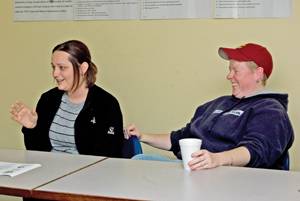Students recount coming out stories

Kerensa Sheker and Stacy E. Schupmann discuss some of the awkward moments of announcing their sexuality to family, during a PFLAG meeting on Tuesday, October 14, 2008, in the Paul Room of the Youth and Shelter Services building on 420 Kellogg. PFLAG stands for the Parents, Families, and Friends of Lesbians and Gays.Photo: Logan Gaedke/ Iowa State Daily
October 13, 2008
While some spent their Tuesday night in the warmth and comfort of their homes, Parents, Families and Friends of Lesbians and Gays members provided comfort to two lesbians and a bisexual who told stories of their “coming out” experiences.
“I thought it was a disease and that if I prayed hard enough, I could fix it,” said Marisol Martinez-Escobar, a lesbian who told her story and graduate student in mechanical engineering.
Martinez-Escobar said coming out to her family was especially difficult because her family is mainly Roman Catholic. Ten years later, she came to the United States from Mexico and “got a boyfriend.”
“I thought, ‘I’m cured,’” she said.
“Iowa State was kind of hard to come out to because I had to classify info and I was in the process of coming out and I don’t know if I’m a lesbian, I don’t know if I’m straight … they don’t like that,” she said. “They feel that you have to have a label.”
It wasn’t until a trip to Spain last summer that Martinez-Escobar said she found her true identity. But in finding herself, Martinez-Escobar said she found difficulty telling those around her, especially her family.
“My mom, she won’t accept it, she won’t talk about it … she still talks to me, and that’s the big thing. My dad says he hopes it’s a phase, but he’s willing to hear me out,” she said.
Linda Trudeau, president of the Ames PFLAG chapter, said events like these help those around the homosexual individuals to understand the fear some may have of coming out to the world around them.
“It’s the cultural stereotypes that prevent them from living their lives in the same way that heterosexuals do,” Trudeau said. “People that are willing to tell their story and come out in public, I think are very brave and kind of the forerunners of, we hope, a new attitude.”
Stacy Schupmann, another lesbian who told her story and a graduate student in educational leadership and policy studies, said she could relate to Martinez-Escobar’s story. She recalled a time when she was with a group of women at a conference.
“They were looking at other guys and saying, ‘Oh my gosh, they’re so hot’ … I didn’t understand it, it didn’t make sense,” she said. “I didn’t have the same feelings towards that gender, but I thought, ‘Oh, maybe that’ll change.’”
She echoed Martinez-Escobar’s thought on religion.
“I thought as long as I stay Christian I’ll get to where I need to be — God wouldn’t do this to me,” she said.
Schupmann said her parents have learned to accept her lifestyle.
“They’re really cool,” she said. “They’re taking in my wife.”
Schupmann and her wife, Kerensa Sheker, a bisexual, were legally married in California this past summer. Schupmann’s parents were their witnesses.
Sheker, who has been “out” for about three years, said she had no idea that she was partially homosexual until she attended college at Iowa State.
She said she worked with Iowa State’s Lesbian Gay Bisexual Transgender Student Services office in college and was an ally of the group. It was through learning more in her diversity classes, talking with Schupmann and learning more about herself that she realized her true sexuality.
She said she called her mother and told her first.
“Actually, the conversation went a lot better than I thought it would go,” she said.
Although she said her mother didn’t agree with her daughter’s lifestyle, she said she would try to learn more about what her daughter was facing. It wasn’t until Schupmann and Sheker got married that her mother truly tried to understand the concept.
“She’s come leaps and bounds,” she said. “She’s doing great.”
The couple will be having an “actual ceremony” this summer in California, where the couple will reside.






